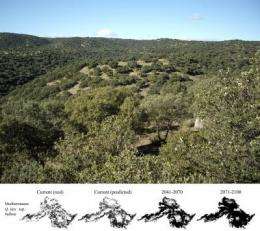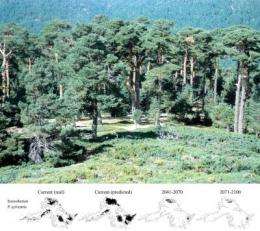Holm oaks will gain ground in Northern forests due to climate change

Holm oaks and other forests in lowland areas of Mediterranean mountains could expand by up to 350% due to global warming. In contrast, those forest formations that are more adapted to cold and humid conditions, such as beech and Sylvester pines, could shrink by up to 99%. Both scenarios could be quite possible in the 21st century according to a model created to study the effects of climate change on the forests of the Sistema Central and the Sistema Ibérico (Spain).
A team led from the Complutense University of Madrid has estimated the possible changes that could be seen in the distribution of 15 of the Iberian Peninsula´s tree species due to climate change from 2041-2070 and 2071-2100. According to what was published in the Journal of Biogeography they used two of the CO2 emissions models of the Intergovernmental Panel on Climate Change (IPCC) when making their estimations.
The main researcher of the study, Diego Ruiz-Labourdette, tells SINC that "the results predict an increase in arid conditions across low mountain areas in the coming decades. This will favour the expansion of Mediterranean perennial species like the holm oak, juniper, the Portuguese oak and the Pyrenean oak, which are better adapted to high temperatures and drought."
These plant communities could increase their dominance by up to 350% with CO2 atmosphere concentrations 0.70 mg/g by 2080 according to one of the scenarios generated by the models. The predictions suggest that spring will progressively arrive earlier, autumn will arrive later and there will be increased summer water shortages in the Iberian Peninsula during the 21st century.

As a result, the models reveal that there will be a reduction in the amount of deciduous forests with trees such as beech and birch, which are adapted to humidity. Eurosiberian conifers (Sylvester pine, high mountain juniper), native to Central and Northern Europe, will also see their distribution area progressively reduced. On the whole, those species adapted to cold and humid conditions could fall by between 80% and 99%.
Researchers outline that the results of the study would have "a significant impact on biodiversity conversation." They propose to prioritise the protection of the eastern massifs of the Sistema Central and its connection with the Sistema Ibérico in order to preserve those tree species found there that are adapted to cold and humid climates. In this way, the mobility of the species through their historic migration paths would be encouraged.
"The study also reveals that in the mountains of the south of Europe the plant formations that will suffer most in terms of distribution will be those found in foothills and low mountain areas. This is due to the increase in water shortages during the season that is good for growth," says another of the co-authors of the study, David Nogués-Bravo, researcher at the University of Copenhagen (Denmark).
This prediction differs from that of the mountain ranges of the temperate regions of Northern Europe. There, the high mountain vegetation will be more affected by climate change, not the vegetation of the lowland areas.
More information: Diego Ruiz-Labourdette, David Nogués-Bravo, Helios Saínz Ollero, María F. Schmitz, Francisco D. Pineda. "Forest composition in Mediterranean mountains is projected to shift along the entire elevational gradient under climate change". Journal of Biogeography, September 2011 (online). Doi: 10.1111/j.1365-2699.2011.02592.x
Provided by FECYT - Spanish Foundation for Science and Technology















